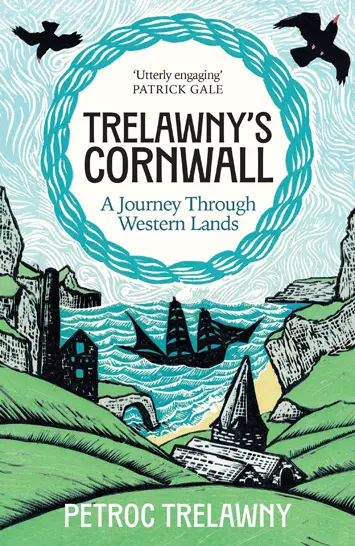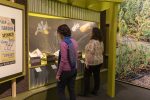Trelawny’s Cornwall by Petroc Trelawny – Review

By Clare Jenkins
Petroc Trelawny is a hero in our house. Presenter of Radio 3’s Breakfast show, his was the calm voice of reassurance throughout the Covid pandemic, and it’s still the radio voice we choose to wake up to.
His name more than hints at Cornish ancestry, and occasionally he’ll be heard broadcasting from the BBC’s radio station in Truro. So it’s no surprise that his first book is a personal as well as historical guide to England’s southernmost county.
Yet his identity as a proud Cornishman has at times been challenged. The book begins with him visiting the village of Pelynt on Trelawny Day, where the sister-in-law of the last Baronet Trelawny calls him “fake”.
She subsequently explains, “I assumed you adopted Trelawny as a nom de plume, a romantic pseudonym to make you sound more Cornish.” In fact, he points out, it’s on his birth certificate – but he reluctantly acknowledges that she has a point. Although the ancestral home was in Cornwall, he himself was born in Worcester where his father, an Army major, had been posted. The family subsequently returned to his grandparents’ home in St Martin-in-Meneage on the Lizard Peninsula when Petroc was five.
In addition, an ancestor had changed his name from Trelawny to Green after a duel, before his great-grandfather changed it back again. And his own first names are actually James Edward Petroc…
As he writes in the book, this ancestral uncertainty spurred ‘a desire to revisit the Cornwall I grew up in, to reclaim my Cornishness, to fill in the gaps in my historical and geographical knowledge, and to get to know and understand the social and economic divisions playing out in the place that I consider home.’
And reclaim it he does, researching not just his own background, but also the social and cultural history of ’this proud, contrary, richly-storied place of more than half a million people.’
At times, I’d have liked to have heard more of his own stories beyond the tantalising glimpses he gives us of his childhood and adolescence. But then, unlike some of his Radio 3 colleagues, Trelawny is a private man, perhaps inheriting from his father a ‘mastery at building walls to keep his feelings safely contained.’
The glimpses we do get can be very effective – and affecting. From boyhood, for instance, he has loved trains, despite the fact that there was no branch line anywhere near St Martin. He dreamt of working for the British Rail inquiry line at Truro Station, surrounded by timetables and answering passenger inquiries. ‘It was the idea of the journey that excited me,’ he writes.
He took his first solo train ride – between Falmouth and Penryn – aged just 11. The following year, another train took his mother from Camborne to the London hospital where she was to die of breast cancer three weeks later. He recalls running alongside the train, waving and smiling goodbye as ‘The service picked up speed and the final carriage overtook me, its red warning light getting fainter and fainter before finally disappearing from view.’ He never saw her again.
As an adolescent, he couldn’t wait to leave Cornwall. He wanted ‘the bustle of Waterloo and Paddington stations, the strings of lights along the Embankment, the illuminated signs of theatreland, the densely packed crowds of people, drawn from around the world’. He landed a job as a trainee broadcaster ‘across the border’ at BBC Radio Devon. Just a week later, he was back home, desperately homesick. The next day, his father drove him back to the station and said he didn’t want to see him again for six weeks. His ‘tough love’ worked. From then on, Petroc knuckled down, settled in, and soared.
Eleven years ago, returning to Cornwall after the death of his father, he couldn’t help noticing the changes. Former fishermen’s cottages are now holiday lets and second homes, ‘sitting dark for half the year’. The village shop has also gone, along with the filling station and Methodist chapel (converted into two houses).
 “Timely reminder of the richness of the county’s history”
“Timely reminder of the richness of the county’s history”
Although he recognises that ‘The holidaymakers who migrate west every year are a vital element of the story of Cornwall’, his pride in the county’s numerous attractions is tempered by the knowledge that tourism has dramatically changed some parts of Cornwall.
He’s gently critical of the ‘part-time villagers’ who drink almond-milk lattes, drive posh cars and live in ‘Trophy residences with balconies, conservatories and garden rooms… that enjoy uninterrupted views out to sea.’ There is no affordable housing left in some parts of Cornwall, like the picturesque fishing village of Coverack.
He discovers a 1949 film, Born of the Sea, which shows what Coverack was like just after the war. It shows (real) fishermen laying crab and lobster pots, village girls picking the daffodil crop, a man thatching his cottage, homes ‘revealing to the camera low beams, smoke-stained walls and heavy furniture’.
‘Today,’ he continues, ‘these same rooms are painted in bright pastel colours with pale pine tables dressed with red gingham or duck-egg blue oilcloth. Blue-and-white striped Cornishware mugs sit on sideboards, and above the nooks that once housed Cornish range stoves are positive signs: “Live life in flipflops”, “Kitchen Closed, I’m at the Beach” – generic holiday-home tat.’
As he strolls through the village one January, most of the houses are ‘dead, empty, locked shut for the winter.’ Reflecting on the Cornish word ‘hireth’, meaning ‘a melancholic homesickness, a nostalgic, wistful yearning for something that seems out of reach’, he acknowledges that it’s dangerous to idealise the past. But he finds it hard not to regret the loss of things like community, communal experiences, shared heritage.
The book is a timely reminder of the richness of the county’s history: its pioneering roles in Methodism; its fishing, farming and tin mining (Cornish miners were believed to be the finest in the world, travelling to far-flung parts to demonstrate their skills, hence the saying ‘If there is a hole dug anywhere on earth, you’re sure to find a Cornishman at the bottom’)…
There are the famous residents and visitors (including John Wesley, Daniel Defoe and, of course, Sir John Betjeman), the thriving music and arts scenes, the language (though he sadly admits he’s not one of the 300-500 fluent Cornish speakers).
Trelawny covers the area’s role in the development of telecommunications as well as its rich maritime history – including Falmouth’s role as Britain’s principal mail port and centre of global trade for 150 years – and some terrible shipwrecks. One claimed the life of 23-year-old Charles Brownjohn, whose gravestone inscription reads: ‘The devoted and only son of a widowed mother. He never said an unkind thing to her in his life’.
References to Trelawny’s own mother are scattered throughout the book: the Dingle’s department store where she used to buy dress fabric; the church where she used to play the organ after parking the family’s red Renault 4 outside; memories of walking with her on Kennack beach; that first solo train ride, where she met him on the platform at the other end and helped him open the fiddly carriage door.
Overall, this memoir-cum-travelogue is both a love song for Cornwall’s heritage, and an elegy to the changes it continues to see. An elegy, too, to his own losses – his mother, his brother William, who died 20 years ago of cancer, his father… It’s a book full of journeys, by train, car, foot – and by memory. And you couldn’t wish for a more charming, intelligent and well-read companion.
‘Trelawny’s Cornwall: A Journey Through Western Lands’ by Petroc Trelawny is published by Weidenfeld & Nicolson









